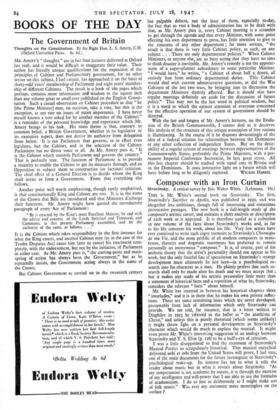The Government of Britain
Thoughts on the Constitution. By the Right Hon. L. S. Amery, C.H. (Oxford University Press. 8s. 6d.) MR. AMERY'S " thoughts " are in fact four lectures delivered at Oxford last yeat, and it would be difficult to exaggerate their value. Their author has literally unique qualifications for the exposition of the principles of Cabinet and Parliamentary government, for no other writer on this subject, I feel certain, has approached it on the basis of thirty-odd years' membership of Parliament and eight years' member- ship of different Cabinets. The result is a book of 160 pages which perhaps contains more information and wisdom to the square inch than any volume great or small ever published on the English Consti- tution. Such a casual observation on Cabinet procedure as that " he [the Prime Minister] may, on occasion, take a vote, but this is the exception, at any rate on issues of major importance. I have never myself known a vote asked for by another member of the Cabinet " is a reminder of the personal knowledge and experience which Mr. Amery brings to his task. His main theme is that, contrary to common belief, a British Government, whether in its legislative or its executive aspect, does not derive its authority from delegation from below. It is not Parliament that governs, or in effect even legislates, but the Cabinet, and in the selection of the Cabinet Parliament has no direct voice at all. As Mr. Amery puts it, " It is the Cabinet which controls Parliament and governs the country." That is perfectly true. The function of Parliament is to provide a majority to enable the Cabinet to get its measures through, and an Opposition to subject them to constructive (or factious) criticism. The chief effect of a General Election is to decide whom the King shall invite to form a Government. From that everything else follows.
Another point well worth emphasising, though rarely emphasised, is that constitutionally King and Cabinet are one. It is in the name of the Crown that Bills are introduced and that Ministers discharge their functions. Mr. Amery might have quoted the introductory paragraph of every 'Act of Parliament :
" Be it enacted by the King's most Excellent Majesty, by and with the advice and consent of the Lords Spiritual and Temporal, and Commons, in this present Parliament assembled, and by the authority of the same, as follows. . . ."
It is the Cabinet which takes responsibility in the first instance for what the King enacts, and another Cabinet may (as in the case of the Trades Disputes Act) cause him later to cancel his enactment com- pletely, with the endorsement, but not by the initiative, of Parliament in either case. As Mr. Amery puts it, " the starting-point and main- spring of action has always been the Government," but as he repeatedly insists, the Government acting always in the name of the Crown.
But Cabinet Government as carried on in the twentieth century has palpable defects, not the least of them, especially to-day, the fact that so vast a body of administration has to be dealt with that, as Mr. Amery puts it, every Cabinet meeting is a scramble to get through the agenda and that every Minister, with some point affecting his own department to press, has little attention to give to the concerns of any other department ; far more serious, " the result is that there is very little Cabinet policy, as such, on any subject . . . There aye only departmental policies." When Cabinet Ministers, or anyone else, are so busy acting that they have no time to think disaster is inevitable. Mr. Amery's remedy is not the appoint- ment of a super-planner subordinate to some particular Minister. " I would have," he writes, " a Cabinet of about half a dozen, all entirely free from ordinary departmental duties. This Cabinet would deal with current administrative questions, as did the War Cabinets of the last two wars, by bringing into its discussion the department Ministers directly affected. But it should also have regular meetings definitely set aside for the discussion of future policy." This may not be the last word in political wisdom, but it is a word to which the earnest attention of everyone concerned for the effective operation of our system of government should be directed.
With the last and longest of Mr. Amery's lectures, on the Evolu- tion of the British Commonwealth, I cannot deal as it deserves. His analysis of the structure of this unique association of free nations is illuminating. In the course of it he disposes devastatingly of the idea of a federal solution for relationships between the Dominions or any other collection of independent States. But on the desir- ability of a regular system of meetings between representatives of the Commonwealth States, preferably the Prime Ministers, with a per- manent Imperial Conference Secretariat, he lays great stress. All this last chapter should be studied with equal care in Britain and in the Dominions. It casts instructive light on a future which will have before long to be diligently explored. WILSON HARRIS.


































 Previous page
Previous page